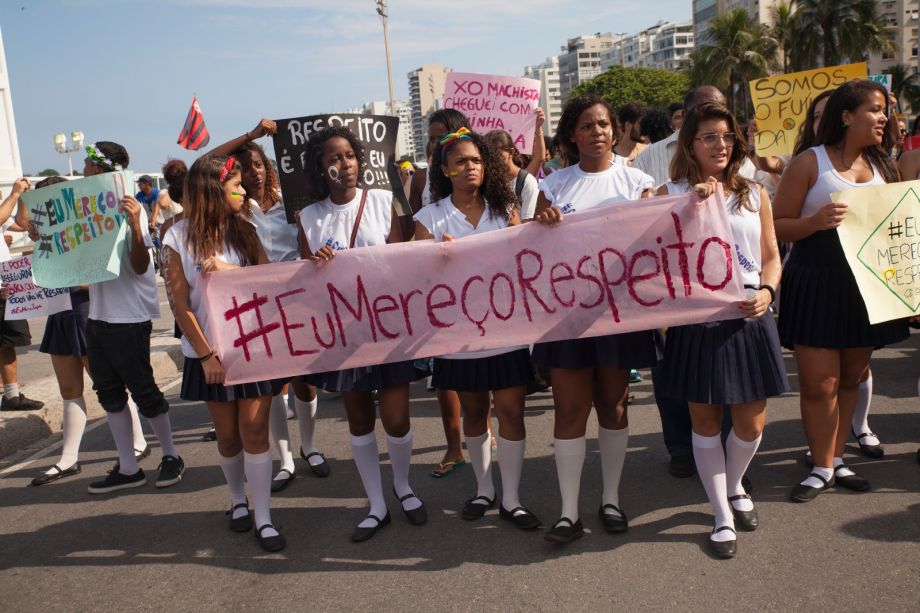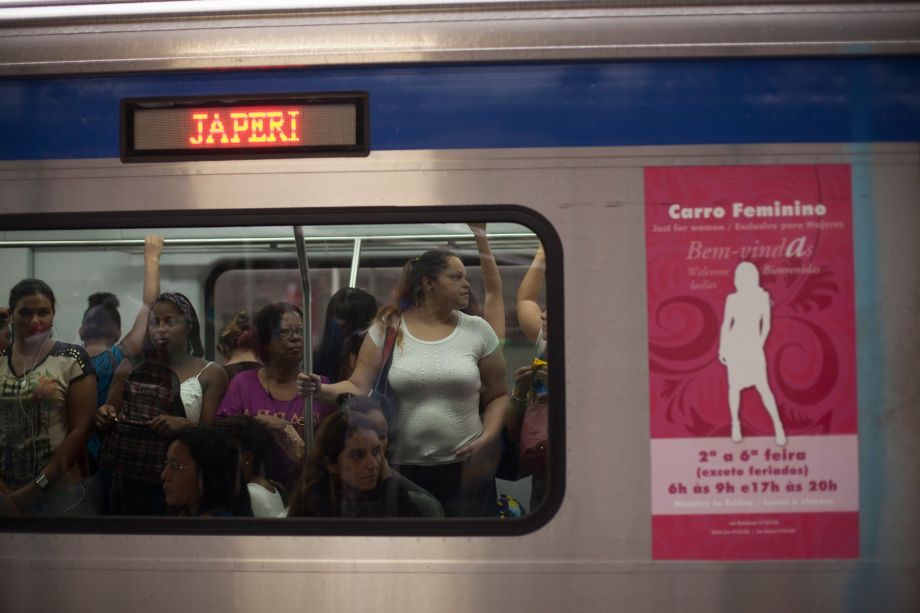Are You A Vanguard? Applications Now Open
A high school student demonstrates against street harrasment on International Women’s Day in Rio.
This is your first of three free stories this month. Become a free or sustaining member to read unlimited articles, webinars and ebooks.
Become A Member“Our uniform is not your sexual fantasy,” yelled 50 Rio de Janeiro public school students as they marched down Copacabana Beach on March 8th, International Women’s Day. The previous week, one of their classmates had fallen asleep while riding a public bus and awoke to find a strange man’s hand beneath her pleated school skirt. Scared he had a gun, the 16-year-old messaged her father, who began to tail the bus in his car, eventually reporting the man for arrest.
“We’re not going to be quiet,” said Morena Perez, 17, at the protest. “We get a lot of harassment, from a very young age. And it’s unacceptable. If people see us mobilized against this, they’re going to start realizing that they have to respect us. A lot of these men, if you talk back and say ‘What’s that you said?,’ their mouths hang open like a fool and they don’t know how to respond.”
She thought for a bit. “It’s because not only do they lack respect, but they lack courage. They think we’re an object.”
When Paloma Ramalho and her classmate Mateus Torres, both 17, were planning the march, Ramalho got in touch with the organizer of another recent event that challenged chauvinism in Rio, the Carnival street parade Bloco das Mulheres Rodadas. “Women who have been around” is a Brazilian slang expression used to humiliate females for the promiscuity that their male peers brag about. This double standard hit a nerve with publicist Renata Rodrigues last December after a right-wing Facebook page posted an image of a man holding a sign saying, “I don’t deserve a woman who’s been around.” The image attracted thousands of likes before women responded with their own meme: a mocking Tumblr entitled “I’ve been around, but I didn’t get with you.”
As soon as Rodrigues announced the parade celebrating female sexuality (and protesting chauvinism, sexism and homophobia), interest exploded. Three marching bands signed up to accompany the parade, and UN Women partnered with the bloco for their 2015 Carnival campaign, “Lose shame, but don’t lose respect.” At the parade, 2,000 women, men and families whirled and danced together to an all-female brass band playing a soundtrack of samba to Britney Spears.
The story of the schoolgirl’s bus incident had already reached Rodrigues when Ramalho sent a message to her. Ramalho had paraded with the Mulheres Rodadas during Carnival, would it be possible for the protesting schoolgirls to symbolically meet up with the Mulheres Rodadas after their march down Copacabana Beach to join forces?
Rodrigues “was thrilled at the idea,” she recalls. For International Women’s Day, the Mulheres Rodadas had already planned to celebrate what they dubbed “International Miniskirt Day” in Copacabana. And so the two groups danced and demonstrated together in a union of Rio’s hyperconnected Internet culture, street activism and long-brewing frustrations with the city’s rampant chauvinism.

Public school students demonstrate against gender violence and harassment on International Women’s Day in Rio.
Brazilian women are fighting stereotypes during an increasingly difficult political moment in their country. Their new Congress is the most conservative since Brazil’s dictatorship, with heavy representation from military groups, the evangelical church and agribusiness. Congressmen have openly discussed rolling back what thin abortion rights exist — today, abortion is only legal in the case of a reported rape. An estimated one million unsafe abortions are conducted in Brazil each year, and in 2014, stories of horrific murders meant to cover evidence of botched abortions hit Rio headlines. Activists worry that austerity measures already underway due to an economic downturn will cut what little funding there is for domestic violence shelters and daycares.
Meanwhile, Brazil is the country with the seventh most reported homicides against women in the world. From 2001 to 2011, over 60 percent of women murdered in Brazil were black.

Sexual violence and harassment is so rampant in Rio that there are gender-segregated trains so women can ride without fear.
More and more, Brazilian women are connecting these experiences with the ubiquitous street harassment they are expected to live with in the country. In 2013, journalist Juliana de Faria founded the campaign Chega de Fiu Fiu (“Enough with the Catcalls”) in São Paulo to map and denounce the unwanted aggressions. “We’re recognizing that what women are going through on the streets is a form of violence, and it’s also connected to male privilege,” says Chega de Fiu Fiu’s Luíse Bello, 25. Chega de Fiu Fiu now compiles data on reported incidents across the country and will soon be launching a documentary and a series of workshops in schools.
Brazilian cities aren’t the only place women are taking a stand against street harassment.
Hollaback is a movement to end street harassment that was born in New York in 2005 and has now spread to 84 cities in 25 countries through a network of local activists. Luma Melo, 24, started a Hollaback chapter in São Paulo when she realized that instead of getting praised for her outstanding work in her physics program, she faced harassment and threats from men in the field. Today, there are Hollaback chapters in Bogotá, Buenos Aires, Mexico City and Panama City as well, and independent national observatories on street harassment in Peru and Chile.
The international network of local campaigns is an Internet-age response to a longstanding but little researched phenomenon. In 2010, American historian Holly Kearl published the first book on worldwide street harassment, which she called “depressingly normal.” It summarized the scattered studies done since the 1980s on the issue and more recent surveys by groups such as the Hollaback chapters.
“Street harassment acts as a gateway crime, opening the door for perpetrators to move toward more serious expressions of violence,” wrote Hollaback founder and executive director Emily May and activist Oraia Reid in the introduction to Kearl’s book. Furthermore, wrote Kearl, street harassment reminds women that “because they are female, men are allowed to interrupt and bother them at any time in annoying, disrespectful, creepy, and threatening ways, virtually without any consequences.”
At its worst, the harassment these groups document causes physical harm to women. At its most common, it paralyzes women in cities. In Brazil, 97 percent of women surveyed by a 2015 ActionAid study said that fear of violence caused them to change their walking routes in cities. Street harassment stops women from being able to work in certain places. It stops some women from taking night classes. And in countries such as Brazil where political organizing involves protests and forums in public spaces, harassment can cut women out of participating in the political process.
“People ask me sometimes why there aren’t more women involved in political and civic life,” says Debjani Roy, deputy director of Hollaback. “How are you going to be comfortable stepping up, raising your hand, and taking leadership roles if you can’t even be comfortable walking down the street?”
In Brazil, women hold only 10 percent of the seats in the National Congress, the largest gender gap in a congress in South America, and only 6 percent of seats on company boards, a corporate gender gap among the largest in the region.

In Brazil, 97 percent of women surveyed by a 2015 ActionAid study said that fear of violence caused them to change their walking routes in cities.
Street harassment limits participation more for women who live in precarious neighborhoods, and in Brazil, rapid urbanization has also led to rapid increases in inequality. In Rio, reports of threats, beatings, and attempted rapes are almost twice as common in peripheral parts of the metropolitan area such as Nova Iguaçu and Bangu as they are in the wealthy South Zone. And among women surveyed in four Brazilian cities, including Rio, by ActionAid, fewer than 5 percent said that they reported gender-based violence to authorities. ActionAid concluded that in Brazil, “the normalization of harassment and sexual violence in public spaces leads to the perception that women must adapt themselves to cities and not that cities should adapt to be equally open to all.”
“When we talk about urban planning today, so much of it is about infrastructure, such as highways and power lines,” says Alice Junqueira, of Chile’s Observatory Against Street Harassment. “But what about instead, planning to make cities good places for the human relationships that will happen in them?”
As a first step, groups mobilizing against street harassment tend to create forums to share both personal stories and tips on when to talk back, stay silent, or, as a bystander, either intervene or comfort a victim. Hollaback, in training all new chapters, teaches how to organize a public safety survey in a neighborhood, a workshop in a school, a discussion group and other interventions, such as a “chalk walk.”
“There’s no magic formula for changing standards of behavior around gender,” says Gisele Netto of UN Women, a UN entity dedicated to gender equity and the global empowerment of women. “It’s daily work. It’s a daily battle, and it’s a battle of education and culture. You have to raise questions that make people stop and think.”
“How are you going to be comfortable stepping up, raising your hand, and taking leadership roles if you can’t even be comfortable walking down the street?”
It may seem contradictory that Rio’s recent burst of deconstructing chauvinism came from Carnival, a holiday long synonymous with the kind of debauchery that is often linked to rape and street harassment. This Carnival, a beer company had to rescind an advertising campaign that touted, “I Left ‘No’ at Home” after outrage from anti-rape activists.
But Carnival’s joking tone also allows space for subversion of social norms — the number of feminist blocos have been growing in recent years. “The neat thing about Carnival is that it calls more attention than other kinds of protest, because you’re attaching protest to an important part of Brazilian culture,” says Maron Galliez, 34, a biology professor who attended the bloco with his wife. Participant and art researcher Laura Formighieri, 27, says blocos have particular power as urban interventions because they “change the course of the city, alter traffic routes, and occupy public spaces with music and culture. Each bloco has a different kind of energy and so generates a different kind of transformation in society.”
For her part, Rodrigues wants more Brazilian women to call out the hypocrisy in their everyday lives. “There is an idea that a Brazilian woman is supposed to be a jungle cat in the bedroom but properly made-up, manicured and not too outspoken in the professional realm,” she says. The double standard extends to things like harsher judgments for women who cheat in relationships, while men get a moral pass, to words that girls are taught to call each other at a young age. As a television announcer put it in a now-viral December segment, “In Brazil today, there are still chauvinists who divide women into two categories: the legitimate wife — idolized, praise her — and the whore.”
It’s the rejection of sexism that brought celebrators joyfully to the streets for both the Carnival parade and the follow-up event on International Women’s Day. During Carnival, geologist Thiago Toribio, 39, attended the bloco with his wife and two daughters, ages 11 and 13. “We’re raising the girls to be feminists,” he said. Teacher Sabrina Machado, 34, said, “We’re here to guarantee that women can do what they want with their bodies and their lives.” For lawyer Anamaria Vicente, 33, identifying as a Mulher Rodada meant “identifying as being autonomous.” Some participants brought Hula-Hoops; some wore taxi costumes to signify their metaphorical getting around; others carried posters with historic women such as Rosa Parks and Brazilian abolitionist and composer Chiquinha Gonzaga.
“I think one reason people felt comfortable showing up is that I am a common woman,” says Rodrigues, adding that she is “38 and not particularly rich,” but that even so, she is in the process of learning to celebrate her own free will. Rodrigues grew more critical about gender when she moved with her husband from Rio to a conservative city in Brazil’s rural south, where men and women play very traditional roles both in and outside of the home. “The other women couldn’t understand why I was unhappy. They said, ‘your husband is paying all the bills, so what’s the problem?’”
For two years now, Rodrigues has been making a new, independent life for herself in Rio, one in which she has candid conversations with her daughter about gender stereotypes that come up at school. Gabriela Martini, 17, one of the schoolgirls who protested on International Women’s Day, says these conversations are crucial both at school and at home. “Why is it that we’re the ones who get harassed? Why are we taught to like pink? Why do we need to play with dolls?”
For some groups, an important step in the fight against street harassment can be legislation. On March 5th, Peru became the first Latin American country to pass a law against street harassment, based largely on the advocacy of sociologist Elizabeth Vallejo, who began the Peruvian organization Paremos el Acoso Callejero (“Let’s Stop Street Harassment”) in 2011. The Peruvian law is heavy on prevention, opening funding avenues for lessons in schools and better harassment tracking and warning in cities. Some groups like Hollaback think preventative measures should be the only ones codified into laws about street harassment, rather than relying on criminalization and imprisonment.
In Brazil, activists say any such law is a long way off. “While our speaker of the house is saying that he will turn in his grave before he discusses legalizing abortion, I don’t think it’s viable that a law like that would pass here,” says Rodrigues, noting that even when laws do pass in Brazil, the real difficulty is in their enforcement. Brazil’s innovative Maria da Penha law against domestic violence is crippled by lack of funding for hotline centers and specialized police attendance. In 2013, the inefficacy of a Rio gender-based violence police station landed in the international spotlight when an American tourist was raped in a public van by a man who had been denounced in detail to such a station the week before. His previous victim, who reported her rape with no result, was a working-class Brazilian woman.
And so fights against street harassment in Brazil will remain civil society education initiatives for now. One Mulheres Rodadas participant, Adriana Mota, works for a nonprofit that advises Brazilian cities such as Rio and São Paulo on gender issues, promoting better lighting for public transportation, better training for domestic violence center staffers and poster campaigns about acceptable behavior on public transportation. Rio has experimented with women-only subway cars for safe commutes at busy hours, but Mota says, “we’re trying to get away from the business of segregating women as the only way to protect them. People need to know how to behave respectfully toward each other on public transportation.”
The latest plans for guerilla-style stereotype busting in Rio will be a workshop that the Mulheres Rodadas have been invited to give on gender and organizing in the public high school of the students who organized the Women’s Day demonstration.
What characterizes today’s leading anti-harassment work is joy in solidarity. At Hollaback’s 2015 conference this month, video of which was immediately posted online in full, performance poets from Girl Be Heard stomped and rhymed onstage to a whooping crowd: “Misogyny knows no color or class. All comments on my ass sound exactly the same.” They continued, “This comes from a patriarchal view of a woman’s place. It isn’t just about personal space … Maybe your misfortune in love means you’ve been doing it wrong this whole time.”
Mota, who has been an activist in the Brazilian women’s movement since the 1980s, says she left the Bloco das Mulheres Rodadas “feeling like I had my battery recharged.” Mota says that in a moment when it’s difficult to move the needle on traditional feminist political battles such as abortion, consciousness-raising through culture is especially important. She quotes sociologist Manuel Castells: “Actions in a network reduce the power of oppression.”
Paloma Ramalho and Mateus Torres, too, count their high school’s march down the beach to join the Mulheres Rodadas as a success. “We had great interaction with people passing by on the street as well,” Torres says. “All of Rio’s tribes were there. Races, classes, sexual orientations.”
Luma Melo of Hollaback São Paulo says the X factor in this kind of activism is the Internet. “It’s connecting and educating people in ways that just wasn’t possible in the past. Even though it may not be reflected in our politicians yet, right now we are educating an entire next generation of leaders.”
That is literally the case for Ramalho and Torres, whose high school specializes in training its students for careers as primary school educators. “Watch out, chauvinists,” they chanted as their march began. “You just turned an entire school of teachers into feminists.”
Our features are made possible with generous support from The Ford Foundation.

Catherine Osborn moved to Rio de Janeiro in 2012 for a Yale research fellowship on public participation in urban planning. She contributes to print and radio outlets. Follow her on Twitter at @cculbertosborn

20th Anniversary Solutions of the Year magazine